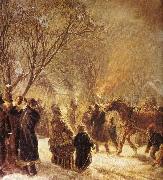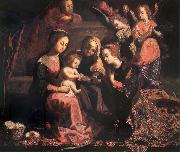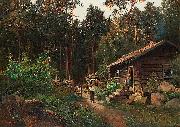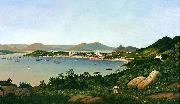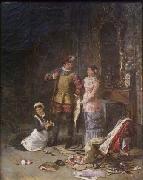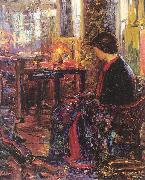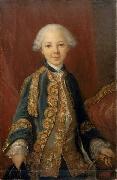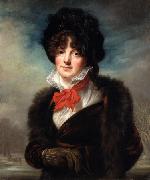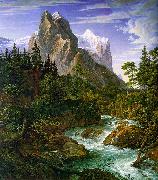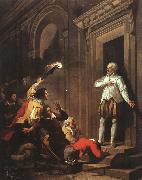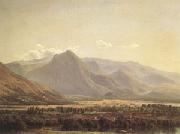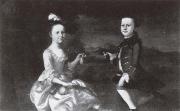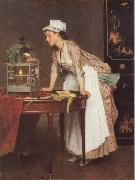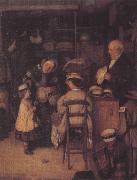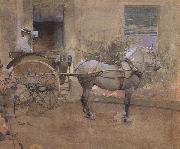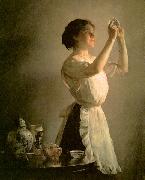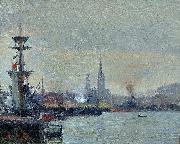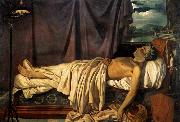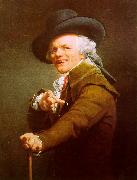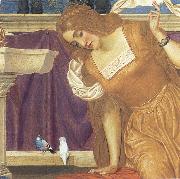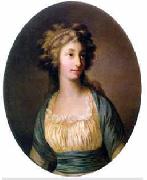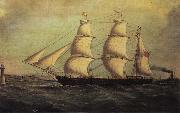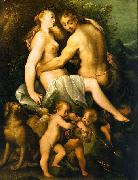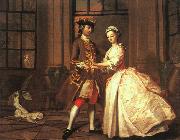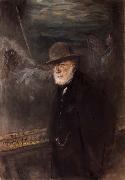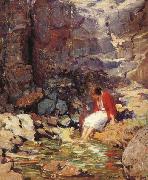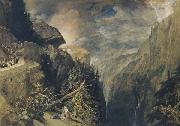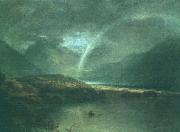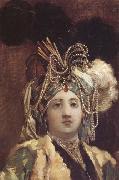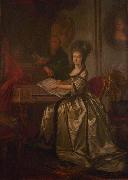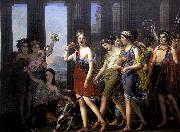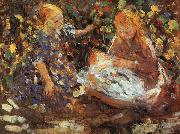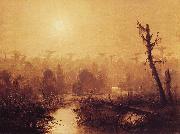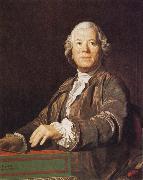|
|
|
|
|
|
|
|
|
|
|
|
|
|
|
|
|
|
|
|
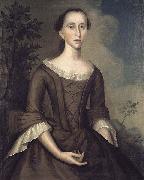 |
Joseph Badger
|
|
(ca.1707-1765) was a portrait artist in Boston, Massachusetts in the 18th-century. He painted some 80 portraits of merchants, businessmen, clergy, and other notables, and their wives and children.
Badger was born in Charlestown, Massachusetts, to tailor Stephen Badger and Mercy Kettell. In 1731 he married Katharine Felch; they moved to Boston around 1733. He was a member of the Brattle Street Church.
He "began his career as a house-painter and glazier, and ... throughout his life continued this work, besides painting signs, hatchments and other heraldic devices, in order to eke out a livelihood when orders for portraits slackened."
|
|
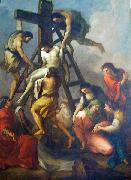 |
Joseph Barney
|
|
(1753 - 13 April 1832), was an English artist and engraver. He is usually described as a pupil of Antonio Zucchi and Angelica Kauffmann and as a fruit and flower painter to the Prince Regent. He was born in Wolverhampton.
Two of his large-scale paintings - altar pieces eThe Deposition from the Crosse (1781) and eThe Apparition of Our Lord to St Thomase (1784) have been preserved in Wolverhampton, and can be seen today at St Johnes church and at St Peter & St Paules Roman Catholic church. During Barneyes life-time, his artistic achievements were respected and praised. In 1798, Stebbing Shaw, mentioning eThe Deposition from the Crosse in his eHistory of Staffordshiree called Barney a enative geniuse of Wolverhampton. In the collection of Wolverhampton Art Gallery, there is a pen and ink drawing, eA Blind Musiciane, which gives some additional idea of quality and versatility of Barneyes works.
|
|
|
|
|
|
|
|
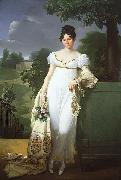 |
Joseph Blondel
|
|
Merry-Joseph Blondel (Paris, July 5, 1781 - Paris, June 12, 1853) was a French neo-classic painter.
After a first training in the Dilh et Guerhard porcelain factory, he later was a painting student of Jean-Baptiste Regnault. He won in 1803 Price of Rome with his painting Enee portant son pere Anchise. He lived in Villa Medicis, in Rome, Italy, from 1809 to 1812, and won a gold award for his painting Mort de Louis XII. He then started a career as an interior decorator (Fontainebleau Castel, Brongniart Palace, Louvre Museum, Senat). |
|
|
|
|
|
|
|
|
|
|
|
|
|
|
|
|
|
|
|
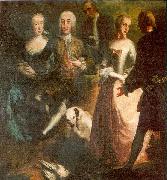 |
Joseph Esperlin
|
|
painted Engagement of Maria Josepha Grafin von Waldburg-Friedberg-Scheer (1731 - 1782) and her cousin, Prince Joseph Wenzel von Furstenberg (1728 - 1783) in 1748 |
|
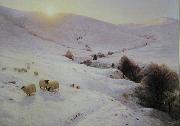 |
Joseph Farqharson
|
|
painted The Sun Peeped o'er yon Southland Hills
Joseph Farquharson DL (4 May 1846 -15 April 1935) was a Scottish painter, chiefly of landscapes. He is most famous for his snowy winter landscapes, often featuring sheep and often depicting dawn or dusk. He was born in Edinburgh, Scotland and died at Finzean, Aberdeenshire, Scotland. |
|
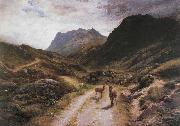 |
Joseph Farquharson
|
|
Joseph Farquharson DL (4 May 1846 - 15 April 1935) was a Scottish painter, chiefly of landscapes. He is most famous for his snowy winter landscapes, often featuring sheep and often depicting dawn or dusk. He was born in Edinburgh, Scotland and died at Finzean, Aberdeenshire, Scotland.
Joseph Farquharson combined a long and prolific career as a painter with his inherited role as a Scottish laird. He painted in both oils and water colours. His mother, a celebrated beauty, was an Ainslie. His early days were spent in his father's house in Northumberland Street below Queen Street Gardens and later at Eaton Terrace beyond the Dean Bridge, Edinburgh and at Finzean, the family estate in the highlands.[1] His father Francis was a doctor and laird of Finzean. Joseph was educated in Edinburgh and permitted by his father to paint only on Saturdays using his father's paint box. When Joseph reached the age of 12, Francis Farquharson bought his son his first paints and only a year later he exhibited his first painting at the Royal Scottish Academy. |
|
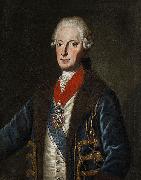 |
Joseph Fischer
|
|
Joseph Emanuel Fischer von Erlach, also Fischer von Erlach the younger (13 September 1693 in Vienna; 29 June 1742 in Vienna) was an Austrian architect of the baroque, Rococo and baroque classicism |
|
|
|
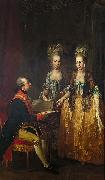 |
Joseph Haunzinger
|
|
Josef Hauzinger: Marie Antoinette, Erzherzog Maximilian und Ludwig XVI., Ol auf Leinwand, um 1776 |
|
|
|
|
|
 |
Joseph Heintz the Elder
|
|
the Elder (Basle, 11 June 1564 - near Prague, Bohemia, October 1609) was a Swiss painter, draftsman and architect.
He appears to have been a pupil of Hans Bock, and to have educated himself by diligent practice in copying the works of Hans Holbein the younger. Between 1585 and 1587 he lived in Rome, registering himself a pupil; to Hans von Aachen. He next settled in Bohemia in 1591, and was at once appointed court painter to Rudolf II, but he remained in Prague for two years only, as in 1593 he was commissioned to make some copies from the antique for the emperor, and for that purpose went to Rome, where he spent some years. In 1604 we hear of him in Augsburg, and from the time we know little of his history, until his decease is recorded in a village outside of Prague.
Heintz's paintings included religious images, portraits, and, following the emperor's taste, erotic mythological themes. They were at one time in high demand, but later on suffered an eclipse. Among them are a family portrait in Berne and that of Rudolf II in Vienna. He was constantly investigating subtle questions of light, and almost all of his landscapes show the interest he took in this technical matter. A notable work by him is the Rape of Proserpine, which hangs in the Dresden Gallery, and was engraved by Lukas Kilian; in the same gallery are two other works, Lot and His Daughters and Ecce Homo. Finally there is his portrait of Constance of Austria. He had a son, who bore the same name, and who painted a few religious pictures; several of these works hitherto attributed to the son are now believed to be late productions by the father.
|
|
|
|
|
|
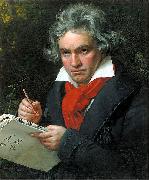 |
Joseph Karl Stieler
|
|
(1 November 1781 - 9 April 1858) was a German painter. Born in Mainz to a family of engravers and die-cutters, Stieler received some artistic training from his father, August Friedrich Stieler (1736 - 1789). Stieler began his career as a painter of miniatures.
His portrait style was most especially shaped during his work in the Parisian atelier of Francois Gerard, a student of Jacques-Louis David. In 1808, he established himself as an independent portraitist in Frankfurt am Main. He traveled through Italy in 1810. In 1816, he traveled to Vienna to paint the portrait of Emperor Francis I of Austria. Between February and April 1820, he worked on his portrait of Beethoven, which is probably the most well-known representation of the composer today.
Stieler worked mainly in the service of the Bavarian court. His painted likenesses in Schloss Nymphenburg, Schönheitengalerie, the so-called Gallery of Beauties, were commissioned by King Ludwig I. Stieler also painted the portraits of Goethe, Amalia of Greece, Friedrich Wilhelm Joseph von Schelling, Johann Ludwig Tieck, and Alexander von Humboldt.
The most distinguishing feature of Stieler's portraits is his utter focus on the sitter. Decorative additions are left out, and there is nothing that distracts the viewer's scrutiny. Stieler accomplished this concentration through deliberate light - dark contrast, which above all highlights the accurately characterized facial features.
He died in Loytown.
|
|
|
|
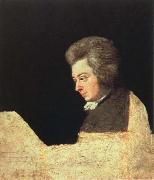 |
joseph lange
|
|
Joseph Lange (1 April 1751 W??rzburg - 17 September 1831 Vienna) was an actor and amateur painter of the 18th century. Through his marriage to Aloysia Weber, he was the brother-in-law of Wolfgang Amadeus Mozart. |
|
|
|
|
|
|
|
|
|
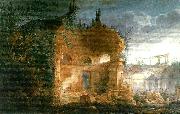 |
joseph michael gandy
|
|
Joseph Michael Gandy (1771 - 1843) was an English artist, visionary architect and architectural theorist, most noted for his imaginative paintings depicting Sir John Soane's architectural designs. He worked extensively with Soane both as draughtsman and creative partner from 1798 until 1809 when he (ultimately unsuccessfully) set up his own practice.
Gandy built little in his career, having a reputation as a difficult individual to deal with. However his work included the Phoenix Fire and Pelican Life Insurance Offices (1804?C1805, destroyed ca. 1920) in London, Doric House at Sion Hill in Bath (1818), and the remodelling of Swerford Park house in Oxfordshire (1824?C1829). Commercially he was a failure and served two terms in a debtors' prison, but his published and exhibited work was largely a critical and popular success. In 1821 he published two articles in the Magazine of Fine Arts on The Philosophy of Architecture. He intended to expand upon this subject in an eight-volume work entitled Art, Philosophy and Science of Architecture, of which his unpublished manuscript survives.
His paintings show a dramatic use of two-point perspective and architectural precision, and also reflect his (and Soane's) fascination with Roman ruins. His architectural fantasies owe a clear debt to Piranesi and play upon historical, literary and mythological themes with a feeling for the sublime that is the equal of his contemporaries J. M. W. Turner and John Martin.
He died in a private asylum in Devon where he had been placed by his family in 1839. Many of his paintings can be seen in the Pictures Room of Sir John Soane's Museum in London. |
|
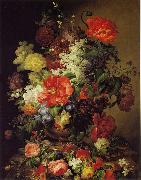 |
Joseph Nigg
|
|
(born 13 October 1782 in Vienna) was an Austrian painter, with painting on porcelain a specialty.
Flower Arrangement by Joseph NiggNigg studied at the Academy of Fine Arts in Vienna with Johann Baptist Drechsler. From 1800 to 1843, Nigg worked as a flower painter in a Viennese porcelain factory. Beginning in 1835, this post also involved holding classes in painting at the factory. With the advent of the Biedermeier Era, flower painting became immensely popular and was also to be found on large porcelain plaques. A piece of this sort, thirty inches in height, was presented by Nigg, on behalf of the Viennese factory, at the The Great Exhibition of 1851 in London.
In addition to working in porcelain, Nigg also created oil paintings, watercolors, and pastel drawings. Two of his paintings, "Grandmother's Bouquet I" and "Grandmother's Bouquet II" have found enduring popularity as poster and print reproductions.
Nigg died in Vienna on September 19, 1863.
|
|
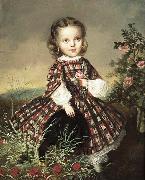 |
Joseph Nitschner
|
|
Description painter
Date of birth 1805(1805)
Location of birth/death Eggenburg Vienna
|
|
|
|
|
|
|
|
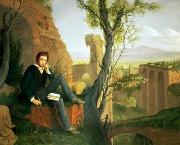 |
Joseph Severn
|
|
(7 December 1793 - 3 August 1879) was an English portrait and subject painter and a personal friend of the famous English poet John Keats. He exhibited portraits, Italian genre, literary and biblical subjects, and a selection of his paintings can today be found in some of the most important museums in London, including the National Portrait Gallery, the Victoria and Albert Museum and the Tate Britain.
The eldest son of a music teacher, Severn was born at Hoxton, near London, and apprenticed at the age of 14 to William Bond, an engraver. Severn was one of seven children; two of his brothers, Thomas (1801-1881) and Charles (1806-1894), became professional musicians, and Severn himself was an adroit pianist. During his early years he practised portraiture as a miniaturist.
|
|
|
|
|







